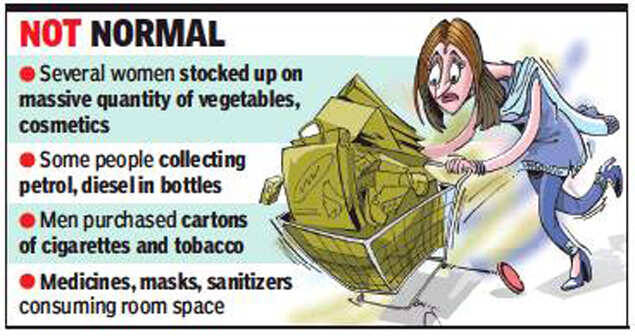- News
- City News
- rajkot News
- Gujarat: Homes choked as Covid-19 triggers abnormal buying
Gujarat: Homes choked as Covid-19 triggers abnormal buying

Representative image
RAJKOT: When Sapan Pansuriya saw his wife buying vegetables in big quantities, he was a bit surprised but didn’t suspect anything wrong. But Pabariya, 43, started getting jittery when his wife continued buying vegetables even as their refrigerator could no more take in. She then started storing the vegetables in their neighbour’s house.

A worried Pabariya then called up the dedicated helpline set up by Saurashtra University’s psychology department to counsel people affected by the prevailing pandemic situation. “We counselled the woman and after a few follow ups she finally stopped purchasing,” said Dimpal Ramani, an assistant professor in the department.
A voluminous study report prepared by analyzing nearly 3,500 calls received on the helpline ever since the pandemic broke out in March last year. Of these, close to 1,000 callers had sought help for abnormal buying, mostly by their spouses.
The study reveals that a large number of people have developed a habit to hoard essential and non-essential items out of fear that they may go out of stock due to the lockdown. The professors analyzed the contents of calls for nearly a month and ‘hoarding’ as well as selfish behaviour were the most striking
“It’s a kind of temporary illness triggered by mindset change over the last 18 months,” said Hasmukh Chavda, assistant professor who co-authored the study along with Ramani and student Arpita Dhamelia.
Researchers were stunned to get SOS calls of people complaining about their spouses hoarding items such as cigarettes.
Hetal Vithlani (name changed), wife of a businessman, voluntarily sought help after realizing that she was going overboard in buying cosmetics.
“I constantly feared that the beauty parlours would never open. So, I started buying all beauty products and cosmetics. But realizing that this was not normal behaviour, I approached the helpline whose volunteers counselled me,” he told TOI.
“One woman told us that her husband had stocked up several cartons of cigarettes, which constricted the space in their room,” added Ramani.
The study details several cases of people who used to buy groceries for a week or month before Covid but are now purchasing in quantities that could last for a couple of years. In fact, commodities like tobacco, cigarettes, snacks, medicines, masks, sanitizers and soft drinks are lying in huge quantities in many homes.
“We also came across people who confessed to having stored petrol and diesel in bottles,” revealed Ramani.
According to the researchers, “People witnessed and experienced harrowing times like shortage of beds, medicines, non-availability of non-essential commodities, which left a deep impact in the minds of people.”
An ayurveda shop owner in Rajkot added, “Earlier, people used to buy campor worth maximum Rs 50 to purify air in the house. I have come across customers who brought camphor worth Rs 5,000 during pandemic.”

A worried Pabariya then called up the dedicated helpline set up by Saurashtra University’s psychology department to counsel people affected by the prevailing pandemic situation. “We counselled the woman and after a few follow ups she finally stopped purchasing,” said Dimpal Ramani, an assistant professor in the department.
A voluminous study report prepared by analyzing nearly 3,500 calls received on the helpline ever since the pandemic broke out in March last year. Of these, close to 1,000 callers had sought help for abnormal buying, mostly by their spouses.
The study reveals that a large number of people have developed a habit to hoard essential and non-essential items out of fear that they may go out of stock due to the lockdown. The professors analyzed the contents of calls for nearly a month and ‘hoarding’ as well as selfish behaviour were the most striking
“It’s a kind of temporary illness triggered by mindset change over the last 18 months,” said Hasmukh Chavda, assistant professor who co-authored the study along with Ramani and student Arpita Dhamelia.
Researchers were stunned to get SOS calls of people complaining about their spouses hoarding items such as cigarettes.
Hetal Vithlani (name changed), wife of a businessman, voluntarily sought help after realizing that she was going overboard in buying cosmetics.
“I constantly feared that the beauty parlours would never open. So, I started buying all beauty products and cosmetics. But realizing that this was not normal behaviour, I approached the helpline whose volunteers counselled me,” he told TOI.
“One woman told us that her husband had stocked up several cartons of cigarettes, which constricted the space in their room,” added Ramani.
The study details several cases of people who used to buy groceries for a week or month before Covid but are now purchasing in quantities that could last for a couple of years. In fact, commodities like tobacco, cigarettes, snacks, medicines, masks, sanitizers and soft drinks are lying in huge quantities in many homes.
“We also came across people who confessed to having stored petrol and diesel in bottles,” revealed Ramani.
According to the researchers, “People witnessed and experienced harrowing times like shortage of beds, medicines, non-availability of non-essential commodities, which left a deep impact in the minds of people.”
An ayurveda shop owner in Rajkot added, “Earlier, people used to buy campor worth maximum Rs 50 to purify air in the house. I have come across customers who brought camphor worth Rs 5,000 during pandemic.”
FacebookTwitterLinkedinEMail
Start a Conversation
end of article
Quick Links
Delhi Air PollutionDelhi TemperatureChennai WeatherBangalore TemperatureCovid vaccination centres in DelhiCoronavirus in DelhiRTPCR test in GurgaonHyderabad RainPollution level in BangaloreDelhi SmogDelhi TemperatureNoida AQIGurgaon AQI todayFire in MumbaiMumbai RainsCovid 19 RT PCR Test in NoidaDelhi AQI todaySrinagar encounter
